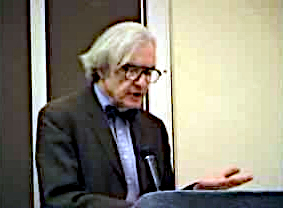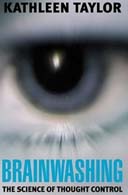Deprogramming is a controversial tactic that seeks to dissuade someone from "strongly held convictions" such as religious beliefs. Deprogramming purports to assist a person who holds a particular belief system—of a kind considered harmful by those initiating the deprogramming—to change those beliefs and sever connections to the group associated with them. Typically, people identifying themselves as deprogrammers are hired by a person's relatives, often parents of adult children. The subject of the deprogramming is usually forced to undergo the procedure, which might last days or weeks, against their will.

Brainwashing is the controversial idea that the human mind can be altered or controlled against a person's will by manipulative psychological techniques. Brainwashing is said to reduce its subject's ability to think critically or independently, to allow the introduction of new, unwanted thoughts and ideas into their minds, as well as to change their attitudes, values, and beliefs.

Hannah Arendt was a German-American historian and philosopher. She was one of the most influential political theorists of the 20th century.
A cliché is a saying, idea, or element of an artistic work that has become overused to the point of losing its original meaning, novelty, or figurative or artistic power, even to the point of now being bland or uninteresting. In phraseology, the term has taken on a more technical meaning, referring to an expression imposed by conventionalized linguistic usage.
A thought-terminating cliché is a form of loaded language, often passing as folk wisdom, intended to end an argument and quell cognitive dissonance. Its function is to stop an argument from proceeding further, ending the debate with a cliché rather than a point. Some such clichés are not inherently terminating. They only become so when used to intentionally dismiss dissent or justify fallacious logic.
In rhetoric, a glittering generality or glowing generality is an emotionally appealing phrase so closely associated with highly-valued concepts and beliefs that it carries conviction without supporting information or reason. Such highly valued concepts attract general approval and acclaim. Their appeal is to emotions such as love of country and home, and desire for peace, freedom, glory, and honor. They ask for approval without examination of the reason. They are typically used in propaganda posters/advertisements and used by propagandists and politicians.
Thought reform can refer to:

Robert Jay Lifton is an American psychiatrist and author, chiefly known for his studies of the psychological causes and effects of wars and political violence, and for his theory of thought reform. He was an early proponent of the techniques of psychohistory.

Indoctrination is the process of inculcating a person or people into an ideology uncritically. Broadly speaking, indoctrination can refer to a general process of socialization. In common discourse, the term often has a pejorative valence to refer to forms of brainwashing or for disagreeable forms of socialization. However, it can refer to both positive and negative forms of cultural transmission, and is evidently an integral element of educatory practice.

In the dystopian novel Nineteen Eighty-Four (1949), by George Orwell, the Thought Police are the secret police of the superstate of Oceania, who discover and punish thoughtcrime. Using criminal psychology and omnipresent surveillance the Thinkpol monitor the citizens of Oceania and arrest all those who have committed thoughtcrime in challenge to the status quo authority of the Party and of the régime of Big Brother.

The People's Volunteer Army (PVA), officially the Chinese People's Volunteers (CPV), was the armed expeditionary forces deployed by the People's Republic of China during the Korean War. Although all units in the PVA were actually transferred from the People's Liberation Army (PLA) under the orders of Chairman Mao Zedong, the PVA was separately constituted in order to prevent an official war with the United States. The PVA entered Korea on 19 October 1950 and completely withdrew by October 1958. The nominal commander and political commissar of the PVA was Peng Dehuai before the ceasefire agreement in 1953, although both Chen Geng and Deng Hua served as the acting commander and commissar after April 1952 following Peng's illness. The initial units in the PVA included 38th, 39th, 40th, 42nd, 50th, 66th Corps; totalling 250,000 men. About 3 million Chinese civilian and military personnel had served in Korea throughout the war.
Milieu control is a term popularized by psychiatrist Robert Jay Lifton to describe tactics that control environment and human communication through the use of social pressure and group language. This includes tactics such as dogma, protocols, innuendo, slang, and pronunciation, which enables group members to identify other members, or to promote cognitive changes in individuals. Lifton originally used "milieu control" to describe brainwashing and mind control, but the term has since been applied to other contexts.
A platitude is a statement that is seen as trite, meaningless, or prosaic, aimed at quelling social, emotional, or cognitive unease. The statement may be true, but its meaning has been lost due to its excessive use as a thought-terminating cliché.

Eichmann in Jerusalem: A Report on the Banality of Evil is a 1963 book by the philosopher and political thinker Hannah Arendt. Arendt, a Jew who fled Germany during Adolf Hitler's rise to power, reported on the trial of Adolf Eichmann, one of the major organizers of the Holocaust, for The New Yorker. A revised and enlarged edition was published in 1964.

The Yan'an Rectification Movement was a political mass movement led by the Chinese Communist Party (CCP) from 1942 to 1945. The movement took place in the Yan'an Soviet, a revolutionary base area centered on the remote city of Yan'an. Although it was during the Second Sino-Japanese War, the CCP was experiencing a time of relative peace when they could focus on internal affairs.
A tautophrase is a phrase or sentence that tautologically defines a term by repeating that term. The word was coined in 2006 by William Safire in The New York Times.

Combating Cult Mind Control is a nonfiction book by Steven Hassan, first published in 1988. The book presents itself as a guide to resisting the mind control practices of destructive cults, and focuses on the research of Margaret Singer and Robert Lifton as well as the cognitive dissonance theory of Leon Festinger. Hassan published a revised edition in 2015 which updated information on organizations that he alleges practice mind control and use social media to increase their influence.

Brainwashing: The Science of Thought Control is a 2004 popular science book explaining mind control, brainwashing, thought reform and coercive persuasion by neuroscientist and physiologist Kathleen Taylor. It explains the neurological basis for reasoning and cognition in the brain, and proposes that the self is changeable, and describes the physiology of neurological pathways. It reviews case studies including Patty Hearst, the Manson Family, and the mass murder/suicide of members of Peoples Temple at Jonestown, and compares the techniques of influence used by cults to those of totalitarian and communist societies. It lays out a model FACET – Freedom, Agency, Complexity, Ends-not-means, and Thinking – which she believes can be used to negate the influence of brainwashing techniques.
Thought reform in China, also known as ideological remolding or ideological reform, was a campaign of the Chinese Communist Party (CCP) to reform the thinking of Chinese citizens into accepting Marxism–Leninism and Mao Zedong Thought (Maoism) from 1951 to 1952. Techniques employed included indoctrination, "struggle sessions", propaganda, criticism and self-criticism, and a variety of other techniques.

Hannah Arendt is a 2012 biographical drama film directed by Margarethe von Trotta and starring Barbara Sukowa. An international co-production from Germany, Luxembourg and France, the film centers on the life of German-Jewish philosopher and political theorist Hannah Arendt. The film, distributed by Zeitgeist Films in the United States, opened theatrically on 29 May 2013.











